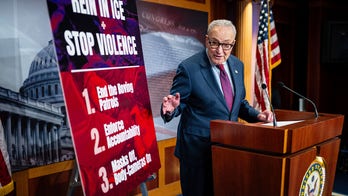The House of Representatives on Friday will vote on whether to make Washington D.C. a state, making it the second time the House has voted on such a measure in the nearly 230 years since the district was established -- but the Democratic-led push is unlikely to succeed due to strong Republican opposition.
Lawmakers donned masks with a “51” imprinted on them, along with a red outline of Washington, D.C. as debate started Friday morning.
DC MAYOR MURIEL BOWSER, IN LATEST STATEHOOD PUSH, SAYS FEDERAL GOVERNMENT 'ENCROACHES' ON AUTONOMY
The last time a push for statehood came this far was in 1993, and supporters of the measure claim there is renewed for momentum in the current climate both because of the coronavirus crisis and the re-examination of America’s history in the wake of the death of George Floyd.
The measure, titled “HR 51,” would convert the capital city into a “commonwealth,” much like Virginia, Kentucky, Massachusetts and Pennsylvania. The measure would rename Washington, DC “Douglass Commonwealth,” after abolitionist Frederick Douglass. Each state has two statues in the Capitol. D.C., since it’s not a state, only gets one statue and that is of Douglass.
D.C. residents currently pay taxes but have no voting representation on Capitol Hill. Article 1, Section 8 of the Constitution called for the creation of a federal district to be the seat of government, and D.C. originally was carved out of two states, Maryland and Virginia, so no single state would have undue influence by hosting the capital.
The city does have some very limited representation, including recognition in the Electoral College, a non-voting delegate and a shadow senator who isn’t formally recognized by the Senate. The current holder of that position, Paul Strauss, told Fox News that D.C. residents pay more federal taxes than any other non-voting territory and do not receive proportional services for their population, which is larger than those of Wyoming and Vermont.
“We are essentially a donor state,” he said.
Strauss, a Democrat, specifically said that when it came to the coronavirus funding, Congress treated D.C. as a territory instead of as a state, and Strauss said “we didn’t get the resources we needed.”
HR 51 would make the D.C. mayor, currently Muriel Bowser, the governor and the city council would act as the legislative assembly. The bill would give it two senators and one House member, and would remove Congress’ role in D.C. affairs.
DC'S 'SHADOW SENATOR' SAYS 'IT'S TIME' FOR STATEHOOD, AS HOUSE PREPARES FOR VOTE
“We know that everyone all across the United States now knows and recognizes the plight of Washington, D.C.,” Bowser said Thursday. “Not only do we not have voting senators and our congresswoman not have the right to vote, the whims of a federal government can encroach up our even limited autonomy.”
The legislation would also carve out a capital city district, a special political subdivision around the White House, government buildings, the National Mall and U.S. Capitol. That would be all that was left of the “District of Columbia.”
The legislation is expected to pass, unlike in 1993 where a bill to give it statehood and rename it “New Columbia” failed 277-153.
TRUMP DISMISSES IDEA OF STATEHOOD FOR DC, CITING POTENTIAL BOOST FOR DEMOCRATS IN CONGRESS
However, the bill is presumed to be dead on arrival in the Senate and is also opposed by President Trump, who would likely wield his veto pen if the bill ever got to his desk.
Republicans are unlikely to be motivated to support such a plan as it would almost certainly guarantee an additional Democratic House member and, more significantly, two Democratic senators.
CLICK HERE TO GET THE FOX NEWS APP
In a recent interview with the New York Post, Trump claimed that Democrats support D.C. statehood because the district is largely Democratic.
“They want to do that so they pick up two automatic Democrat — you know it’s 100 percent Democrat, basically — so why would the Republicans ever do that?” Trump said. “That’ll never happen unless we have some very, very stupid Republicans around that I don’t think you do.
The last time the U.S. admitted two states to the union was in 1959 and that was done as a compromise, whereby Hawaii was admitted as the “Republican” state and Alaska was admitted as a “Democratic” state” -- although both states’ politics have flipped since then.
Fox News’ Ronn Blitzer contributed to this report.














































